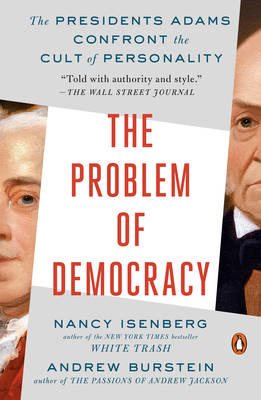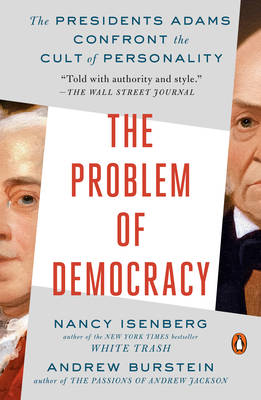
Je cadeautjes zeker op tijd in huis hebben voor de feestdagen? Kom langs in onze winkels en vind het perfecte geschenk!
- Afhalen na 1 uur in een winkel met voorraad
- Gratis thuislevering in België vanaf € 30
- Ruim aanbod met 7 miljoen producten
Je cadeautjes zeker op tijd in huis hebben voor de feestdagen? Kom langs in onze winkels en vind het perfecte geschenk!
- Afhalen na 1 uur in een winkel met voorraad
- Gratis thuislevering in België vanaf € 30
- Ruim aanbod met 7 miljoen producten
Zoeken
The Problem of Democracy
The Presidents Adams Confront the Cult of Personality
Nancy Isenberg, Andrew Burstein
Paperback | Engels
€ 30,95
+ 61 punten
Omschrijving
"Told with authority and style. . . Crisply summarizing the Adamses' legacy, the authors stress principle over partisanship."--The Wall Street Journal How the father and son presidents foresaw the rise of the cult of personality and fought those who sought to abuse the weaknesses inherent in our democracy. Until now, no one has properly dissected the intertwined lives of the second and sixth (father and son) presidents. John and John Quincy Adams were brilliant, prickly politicians and arguably the most independently minded among leaders of the founding generation. Distrustful of blind allegiance to a political party, they brought a healthy skepticism of a brand-new system of government to the country's first 50 years. They were unpopular for their fears of the potential for demagoguery lurking in democracy, and--in a twist that predicted the turn of twenty-first century politics--they warned against, but were unable to stop, the seductive appeal of political celebrities Thomas Jefferson and Andrew Jackson. In a bold recasting of the Adamses' historical roles, The Problem of Democracy is a major critique of the ways in which their prophetic warnings have been systematically ignored over the centuries. It's also an intimate family drama that brings out the torment and personal hurt caused by the gritty conduct of early American politics. Burstein and Isenberg make sense of the presidents' somewhat iconoclastic, highly creative engagement with America's political and social realities. By taking the temperature of American democracy, from its heated origins through multiple upheavals, the authors reveal the dangers and weaknesses that have been present since the beginning. They provide a clear-eyed look at a decoy democracy that masks the reality of elite rule while remaining open, since the days of George Washington, to a very undemocratic result in the formation of a cult surrounding the person of an elected leader.
Specificaties
Betrokkenen
- Auteur(s):
- Uitgeverij:
Inhoud
- Aantal bladzijden:
- 576
- Taal:
- Engels
Eigenschappen
- Productcode (EAN):
- 9780525557524
- Verschijningsdatum:
- 14/04/2020
- Uitvoering:
- Paperback
- Formaat:
- Trade paperback (VS)
- Afmetingen:
- 137 mm x 211 mm
- Gewicht:
- 521 g

Alleen bij Standaard Boekhandel
+ 61 punten op je klantenkaart van Standaard Boekhandel
Beoordelingen
We publiceren alleen reviews die voldoen aan de voorwaarden voor reviews. Bekijk onze voorwaarden voor reviews.









